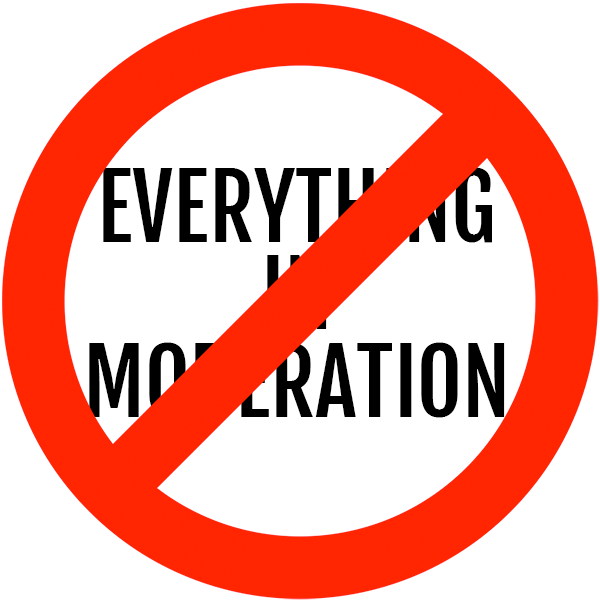
In part 1 we talked about moderation and how it’s a bad fit for humans (or living things in general) biologically. I don’t know about you but for me biological incompatibility is a pretty good compelling not to chase something, but I think there’s another good reason.
As previously discussed we can sort of characterize moderation when it comes to diet as eating a consistently appropriate amount of relatively good quality food. Appropriate amount isn’t defined by any subjective external judgement, we’re talking a quantity that is close or exactly at your metabolic rate.
From a practical standpoint what would need to happen for someone to be able to actually do that?
For one they would need to know how much to eat, what to eat, and in what proportion. If we’re coming from an ancestral perspective with deep cultural roots and rituals then you would have an almost universal intuition that you’d eat a meal about three times a day, have almost nothing in between, and the meals would consist of a small portion of meat, some vegetables, and some sort of starch.
Of course a modern human, especially in the west, has none of that cultural programming to fall back on. So now instead of an intuitive understanding you need a deep technocratic cognitive understanding of macronutrients and quantities. You need to know that you need (rough numbers, okay?) 150 grams of protein, 100 grams of fat, and 150 grams of carbohydrates.
You need to learn and understand that 50 grams of carbohydrates from Honey Nut Cheerios may not be qualitatively the same thing as 50 grams of sweet potato, even if quantitatively they’re the exact same thing.
Once you have a good understanding of the total quantities you need to eat, and an idea of how to break them up (it’s not at all self-evident and obvious that a normal portion of protein is only about 35 grams of protein) into meals you then need to know how to actually put those meals together.
Cooking isn’t hard, but like anything that isn’t hard once you know how to do it the idea of cooking a meal from raw meat, dirty vegetables, and dried starch grains can be pretty daunting. If your experience with cooking has more to do with packets and boiled water than sauteeing garlic until it’s fragrant you’re going to experience a pretty steep learning curve.
But wait, you can’t get on with your cooking until you shop for ingredients. Shopping for raw ingredients can be pretty intimidating. How much do you buy? What do you buy? Do you have a recipe you’re following? If not it’s a pretty tall order to send someone to the grocery store to just by raw ingredients and put together a meal when they have no experience doing so.
The fact is we could go on and on breaking down the skills that make up the ladder of being able to eat moderately. Maybe you have some of the skills, but do you have all of them? If you have all of the skills in a conscious competence sense, can you execute on them without thinking. Is it easy and automatic?
I would argue that most people who are getting the “everything in moderation” advice are probably lacking at least some of the core skills that you would actually need to eat moderately consistently.
Does giving them advice imbue them with those skills? No. Does it actually offer them anything they can act on what so ever? No!
Not only is “everything in moderation” a biological improbability (especially in modern times with engineered foods that are out of step with our biology) but it’s also a practical impossibility.
Acknowledging that there is a whole ladder of skill involved in complex functions goes a long towards helping you understand how to achieve those functions, or help someone else achieve them. It’s pretty poor coaching to tell someone “everything in moderation” and send them on their way to figure it out. It’s phenomenal coaching to give them bite-sized skills to work on and the framework with which to integrate them into complex functions.
Break it down, learn, act, do better.


Leave a Reply
You must be logged in to post a comment.